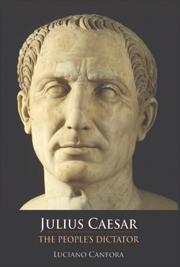Book contents
- Frontmatter
- Contents
- Translators' Note
- Acknowledgements
- Foreword
- PART I FROM SULLA TO CATILINE
- PART II FROM THE TRIUMVIRATE TO THE CONQUEST OF GAUL
- 9 The ‘Three-Headed Monster’
- 10 The Consequences of the Triumvirate: The View of Asinius Pollio
- 11 The First Consulship (59 BC)
- 12 An Inconvenient Ally: Clodius
- 13 Semiramis in Gaul
- 14 The Conquest of Gaul (58–51 BC)
- 15 The Black Book of the Gallic Campaign
- PART III THE LONG CIVIL WAR
- PART IV FROM THE CONSPIRACY TO THE TRIUMPH OF CAESARISM
- Chronology
- Bibliography
- Index
9 - The ‘Three-Headed Monster’
from PART II - FROM THE TRIUMVIRATE TO THE CONQUEST OF GAUL
Published online by Cambridge University Press: 05 August 2013
- Frontmatter
- Contents
- Translators' Note
- Acknowledgements
- Foreword
- PART I FROM SULLA TO CATILINE
- PART II FROM THE TRIUMVIRATE TO THE CONQUEST OF GAUL
- 9 The ‘Three-Headed Monster’
- 10 The Consequences of the Triumvirate: The View of Asinius Pollio
- 11 The First Consulship (59 BC)
- 12 An Inconvenient Ally: Clodius
- 13 Semiramis in Gaul
- 14 The Conquest of Gaul (58–51 BC)
- 15 The Black Book of the Gallic Campaign
- PART III THE LONG CIVIL WAR
- PART IV FROM THE CONSPIRACY TO THE TRIUMPH OF CAESARISM
- Chronology
- Bibliography
- Index
Summary
In politics nothing is contemptible.
DisraeliHad the optimates not been utterly obsessed with the idea that somebody – and that somebody could only be Pompey – was striving after a new form of personal power, they would probably not have offered Pompey to Caesar as a valuable ally. To the republic, Pompey was an extremely burdensome legacy of Sulla, the more so because his power and military prestige had grown, resting on a fine web of clientship relations which reached from one end of the empire to the other. He had followed in the footsteps of Sulla, the victor in the civil war against Marius. After Sulla's death, he had lent decisive support to the victory over Sertorius when the latter, at the head of the revolt in Spain, threatened to detach a part of the empire, one of the most important parts for the domination of the West. And already on that occasion he had made it quite plain to the Senate that he too – like Sulla before him – would march on Rome if the Senate did not supply everything he needed for his campaigns. And all things considered, Pompey's decision to align himself with Crassus, when both were consuls in 70 bc, to demolish jointly the foundations of the Sullan constitution, was from the optimates' point of view a sort of de facto bloodless coup d'état.
- Type
- Chapter
- Information
- Julius CaesarThe People's Dictator, pp. 63 - 71Publisher: Edinburgh University PressPrint publication year: 2007

